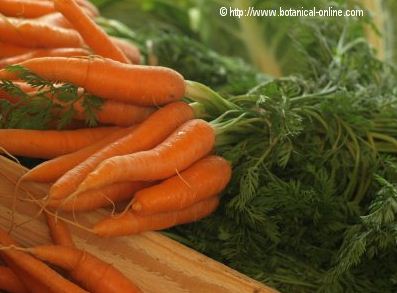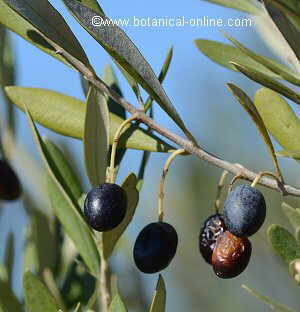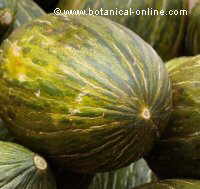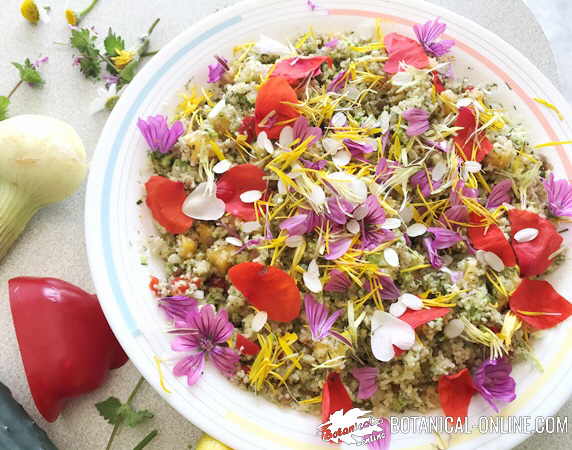Contents
- 1 Healthy advantages of eating leeks
- 1.1 PROPERTIES OF LEEKS
- 1.2 A food with antibacterial properties
- 1.3 What components do leeks have?
- 1.4 Leek is a vegetable that helps improve circulation
- 1.5 Eating leeks helps lower cholesterol and triglycerides
- 1.6 Leeks can help treat constipation
- 1.7 Leek is a good diuretic
- 1.8 Leek for the respiratory system
- 1.9 Vitamins and minerals provided by the leek
- 1.10 Nutritional composition of leek
Healthy advantages of eating leeks
PROPERTIES OF LEEKS
A food with antibacterial properties
Leek (Allium ampeloprasum var. Porrum L.) is a liliaceous plant, like garlic and onions, but, unlike the last to vegetables, leek has practically no bulb. However, they share many of their properties.

Photo of leeks in a market
What components do leeks have?
Like onions and garlic, leeks are rich in sulfur compounds, especially allicin, which give them their antibacterial, circulatory and diuretic properties.
Leeks are a good natural antibiotic, very suitable for eliminating the microorganisms that cause many intestinal diseases.
Eating leeks in abundance will help improve bowel conditions and prevent abnormalities such as intestinal rottenness causing flatulence, diarrhea, etc.
On the other hand, its richness in selenium helps to strengthen the defenses, constituting one of the foods that most protect against the appearance of contagious diseases.
Leek is a vegetable that helps improve circulation
The sulfur compounds of the leek have fluidifying properties of the blood. Components as important as alliin and ajoene help the body to avoid the appearance of thrombi or clots. By improving blood circulation, the intake of leeks is suitable for those with a number of circulatory diseases related to poor circulation: obesity, diabetes, cholesterol, angina pectoris, myocardial infarctions, etc. (In these cases, it is also recommended to reduce foods with lots of salt and foods with a lot of saturated fat).
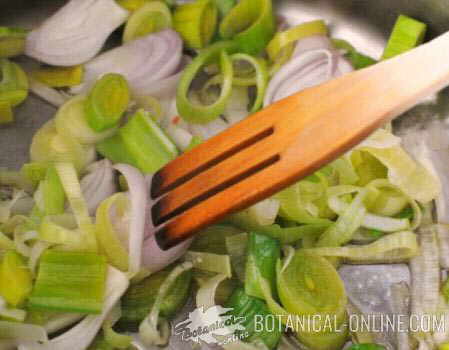
Photo of leeks
On the other hand, its richness in zinc can help contribute to the fight against the degeneration of the walls of the arteries, which, together with its ability to dilute the blood, makes it one of the most suitable foods in the prevention of diseases of the veins, such as varicose veins and hemorrhoids.
For all this, it is very interesting to eat leeks in abundance, but especially as we get older and our blood vessels suffer the excesses over the years and the results of inappropriate food and vital habits.
Eating leeks helps lower cholesterol and triglycerides
It has been proven that diets based on an abundance of vegetables such as leeks can help lower triglycerides and cholesterol levels, helping to keep the arteries in better condition and prevent vascular accidents related to high levels of bad cholesterol (LDL cholesterol) in the blood.
Leeks can help treat constipation
Its mucilage content gives it adequate properties for the treatment of constipation. Its fermentative fiber is susceptible to being fermented by the bacteria of the colon and helps to increase the microbiota or healthy bacterial fermentative flora, related to the prevention of colon cancer.
In this way, the leeks, for their already mentioned antibacterial properties, their fermentative property and their slight laxative effect, are positioned as one of the most suitable foods in the health of the intestines.
Leek is a good diuretic
For its principles with diuretic properties, leeks promote the elimination of body fluids. This property is widely used to help increase urine and elimination of substances in case of obesity, and fluid retention due to rheumatism, arthritis or gout. Its sulfur content gives it this characteristic of diuretic food to increase the elimination of metabolic waste.
An abundant urination will also help during the treatment of urinary diseases and for the prevention of kidney stones. It is also recommended for consumption in liver cleansing, depurative, slimming diets, etc.
Due to its high potassium content, leek is an excellent food to accompany meats, fish and foods rich in sodium, because it balances excess salt in the diet and facilitates its elimination. This food is recommended for people with hypertension.
Leek for the respiratory system
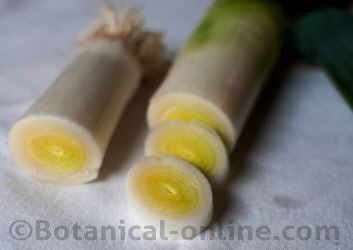
Photo of cut leek
When chewing leek, especially raw, its essential oils are rich in sulfur and alliin with bactericidal properties. In this way, when breathing, we inhale these components that go on to decontaminate the mouth the nose and throat of pernicious bacteria.
Eating salads with a little leek olive oil should be present in the diet to prevent colds, tonsillitis, pharyngitis, etc. These recommendations also serve for raw onion or crushed garlic in dishes, since the three plants have similar principles, with garlic being the most antimicrobial.
Vitamins and minerals provided by the leek
Leeks are foods that provide a lot of folic acid or vitamin B9, which is very necessary for the proper growth and development of children, in pregnancy and during breastfeeding.
It contains many flavonoids, such as quercetin, with antioxidant, anti-inflammatory, antiallergic, antiasthmatic and antiarthritic properties.
Traditionally it has been said that leeks can help increase desire, prevent the appearance of gray hair and protect the skin from the harmful rays of the sun.
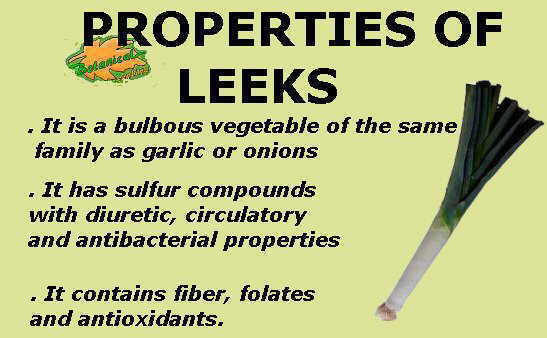
Summary with the properties of the leek and its possible health benefits. The leek is very rich in fiber and sulfur compounds with antiseptic properties.
Nutritional composition of leek
Note: The data in the nutritional tables are indicative, the values may change depending on the raw material, cultivation medium, culinary treatment, etc.
As indicative values, the leek contains:
| Nutritional composition of leeks per 100g | |
|---|---|
| Nutrient | Amount |
| Calories ( Kcal) | 61 |
| Carbohydrates (g) | 14,15 |
| Proteins (g) | 1,5 |
| Fats (g) | 0,3 |
| Fiber (g) | 1,8 |
| Iron (mg) | 2,1 |
| Calcium (mg) | 60 |
| Zinc (mg) | 0,11 |
| Phosphorus (mg) | 31 |
| Potassium (mg) | 160 |
| Sodium (mg) | 18 |
| Vitamin C ( mg) | 12 |
| Thiamin (vitamin B1) (mg) | 0,06 |
| Riboflavin (vitamin B2) (mg) | 0,03 |
| Niacin ( vitamin B3) (mg) | 0,4 |
| Pyridoxine ( vitamin B6) (mg) | 0,23 |
| Folates ( vita mina B9) (mcg) | 64 |
* Caption: ![]() = This indicates high content in this nutrient
= This indicates high content in this nutrient
![]() More information on leeks.
More information on leeks.

